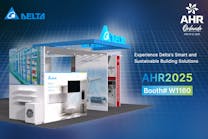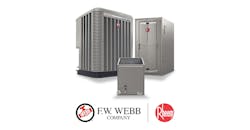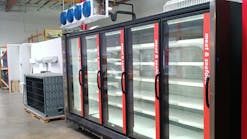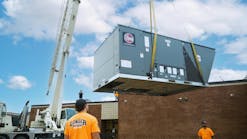General Contractor with Mission Critical Expertise Expands into California
markets are each seeking new levels of sophistication for their spaces, and our firm can deliver that, for both. We can provide deep value for our clients — whether they’re looking to embrace the latest trend in workplace interiors to promote productivity and retain top talent, or seeking to build the most efficient and impressive data center to date.”
Workplace interiors had long been one of HITT’s strongest market sectors, and over time, it found it could also meet its customer’s growing technology-based projects. The 80-year-old firm has been involved in mission critical projects for 10 years.
“We found, while we were doing a lot of tenant work and building work for Fortune 100 and Fortune 1000 companies, that as technologies progressed, those same companies had large needs on the technology side. We started the Mission-Critical group about 10 years ago to service the same clientele, but in different sectors of their businesses. Much of our mission critical work is for cloud providers or content providers,” Kane explains.
Kane notes that HITT Contracting’s specialization in both critical facilities and corporate interiors ensures expertise in a diverse range of projects.
Ranked as the 68th largest general contractor in the U.S., HITT Contracting Inc. was founded in 1937 outside of Washington, D.C. by the husband-and-wife team of Warren and Myrtle Hitt. Over the course of its history, the company has expanded to 12 offices across the United States, including Atlanta, Baltimore, Charleston, Dallas, Denver, Houston, New York, Richmond, Seattle, South Florida, Washington, D.C., and now California. HITT’s client-focused teams fulfill any program need from new construction base building and complete interior fit-outs, to commercial service work. HITT employs nearly 1,000 team members, including a skilled in-house field force.
HITT’s expertise in corporate interiors has been a key driver in the company’s 80-year growth. The firm is a leading, nationwide interior contractor in major markets such as Atlanta, Charleston, D.C., and Northern Virginia. During just the past five years, HITT has completed more than $900 million in interiors work, ranging from small service projects to headquarters for some of the most powerful Fortune 500 companies. HITT is currently delivering interiors for NCR’s 500,000-sq.ft. headquarters in Atlanta, and is contracted to deliver 700,000 sq.ft. of interior office space at Capital One’s headquarters located outside of Washington, D.C. beginning in 2020.
10 Million Square Feet of Data Centers
HITT’s mission critical business sector has completed more than $1.3 billion and nearly 10 million square feet of data centers. Since launching this division in 2007, HITT Contracting has delivered mission critical projects in 20 states and Canada for numerous Fortune 500 companies, government agencies, communications firms, cable/internet/telephone providers, colleges, and hospitals. The firm delivers more than 100 mission critical projects each year.
“Our clients particularly value HITT’s in-house mechanical/electrical/plumbing (MEP) experts, each of whom brings deep knowledge in the construction and commissioning of mission critical systems,” Kane says.
HITT Contracting’s portfolio includes clients such as Cisco Systems, WeWork, Symantec, SAP Americas, Microsoft, JLL, Time Warner Cable, Verizon, CBRE, Yelp, Fendi, and Under Armour, among others, and expects to meet the needs of many more from its new California location.
“We anticipate serving both existing and new clients from our Bay Area location. HITT delivers on both small, service-type work, and major projects,” Kane notes. “For example, we began our initial relationships with some of our best Fortune 500 clients by delivering on small projects when the company had a need. Today, we are delivering these same firms complex, multi-million-dollar, construction projects. The key to our approach is that every project is the most important. No matter the size or scope of the project, we offer the same service and quality.”
HITT will take on a wide range of projects of varied costs, from $200,000 to $200 million in scope. “That’s very unusual for a contractor of our size, to be nimble enough to provide that type of construction service. A lot of the large, national contractors don’t want to perform projects under $10 million, and a lot of smaller firms can’t take on projects over $10 million," Kane says.
With building owners and managers more keenly aware of energy costs and various ways to conserve energy through smarter technology, Kane sees a greater interest in lifecycle cost projections, over the “first cost” preoccupation of years gone by.
“Because of environmental concerns and energy concerns, people are more cognizant of the cost of energy, from both dollars and cents standpoint as well as environmentally,” he says.
Kane, who launched HITT’s highly successful mission critical sector, notes that the expansion to the Bay Area is a natural next step in the firm’s continued growth and momentum.
“We look forward to the opportunity to offer our current clients the service they desire on the West Coast, and to building new relationships with future clients and partners,” he says. “In addition to our track record of providing high-quality work on contracts that are in the hundreds of millions, we are proud to service our clients with their much smaller projects. We like to say we’re the only contractor you will ever need, and we back that up with a 24/7 team of people available to our clients.”
Kane says HITT’s success is based in it’s being able to deliver consistent quality and schedules to clients across the country.
“That makes their job easier. Most of corporate real estate in the larger corporations is pretty thin from a staff standpoint. We help them do their jobs with less stress,” he says.
HITT’s leadership team sees the growing demand for education related to smart buildings. With that in mind, HITT recently made a sizable donation to Virginia Tech to develop a center for innovation and smart building.
“That is something we’re considering [entering] while our data center and construction isn’t necessarily aimed at it. We’re aware of smart buildings, and are keeping our eye on how that’s going to affect the future of this industry,” Kane says.










